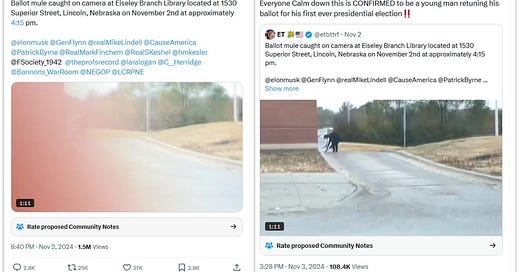🤥 Faked Up #25
I spent 24 hours on X's "Election Integrity Community" so you didn't have to, Dublin's hoax Halloween was an SEO success, and HeyGen let me create a false video about Valencia's floods
I am several hours late because I spent way too much time reviewing tweets about alleged voter fraud in the US presidential election. Thanks for your patience!
This newsletter is a ~6 minute read and includes 69 links.
Keep reading with a 7-day free trial
Subscribe to Faked Up to keep reading this post and get 7 days of free access to the full post archives.




